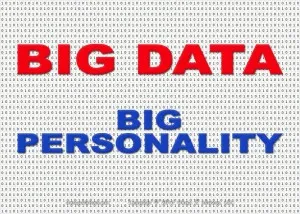Big Data, Big Personality Assessor
 Imagine applying for a job. In addition, to all the necessary disclosures for background checks, references, credit reports, drug tests and personality assessments, there is a new one: accessing our consumer history, social media activity and internet browsing records. While perhaps not the actual data, future employers could gain rights permitting its input through personality assessment applications contracted through third parties.
Imagine applying for a job. In addition, to all the necessary disclosures for background checks, references, credit reports, drug tests and personality assessments, there is a new one: accessing our consumer history, social media activity and internet browsing records. While perhaps not the actual data, future employers could gain rights permitting its input through personality assessment applications contracted through third parties.
This differs from current personality assessments because almost all are currently self-reporting, having us respond based on who we think we are. Big data though can give greater insight into who we are by analyzing what we actually do. Consumer psychology and online dating have already exposed contradictions with self-reporting methodologies.
Already, in “Your Doctor Knows You’re Killing Yourself” (BloombergBuisnessweek, June 26, 2014) by Shannon Pettypiece and Jordan Robertson, reports of medical centers accessing consumer data, “public records, store loyalty transactions, and credit card purchases.” By putting this “data into predictive models that give [health] risk scores,” doctors can better advise patients based on what they’re doing not what they say they’re doing.
Private Traits and Attributes are Predictable from Digital Records of Human Behavior (pdf), by Michal Kosinski, David Stillwell and Thore Graepel, shows what people’s Facebook Likes disclose. Commercially, providers are already tapping Twitter streams. Since our personalities often influence our health and job performance, medical professionals could further improve if they had better insight into our personalities.
Politicians already use this information to analyze candidates and issues we like (see “Data Unravels Voters’ Political DNA” [CBS Evening News, October 24, 2006]). Since personality correlates strongly to politics, we’re already well on our way of tapping big data’s full personality assessment capabilities. Furthermore, as 60 Minutes (March 9, 2014) reported in “The Data Brokers: Selling Your Personal Information,” data brokers avail this information in a relatively unregulated market. This means that the only problem with the above scenario might be that employers won’t need our permission.



Two big questions:
(1) Does “relatively unregulated” include – at least – being able to know of the end recipient of any personal information collected? And
(2) Are there any “disclosure” requirements as to how the end recipient can use the information (admittedly nearly impossible to monitor) and to whom the conclusions must be reported OR cannot be reported – along with the justification for those conclusions?
Seems to me the further we get into the 21st century, the closer we get to 1984…
John, here is my best understanding of this. It seems we are advised on the front end that our information may be sold (that is why you get all these privacy notices in the mail especially from financial providers); however, it doesn’t seem we need to be informed as to whom it was sold. Therefore, as an example, a retailer does not need to tell us it bought the information about us to tailor the mailing it just sent to us. Therefore, I don’t believe employers need to tell you they bought the information on you.
At the moment, in regard to (2), I don’t believe there are any. I do believe the impediments are more financial at this point. Data brokers are mainly interested in selling our data in bulk, not in one’s and two’s. So, therefore, it might not be financially feasible for an employer to request just the information on John Bennett, the applicant. It’s similar to going to a lumber manufacturer, who’s used to dealing in large orders, and placing an order for a single 2×4. Still, it only takes one person to find a way to do this economically before you could buy the data on me. As it stands now, if you are willing to pay, I’m sure you could buy the data on everyone in your zip code and more.
What could happen as I see it, is that there could be “retailers” of data who buy from brokers and then parcel it out in smaller allotments or narrower applications that they sell. For instance, if you sell cars and want to know who in your market area would most likely buy a particular new model of car, an intermediary would by the data in bulk for let’s say the country and then parcel it out to those in specific markets. Their differentiator is the application that would match car model to personality type. It’s very similar to firms who sell steel in bulk to fabricators who resell it to manufactures for end products. Data could be a whole industry onto itself if it’s not already.